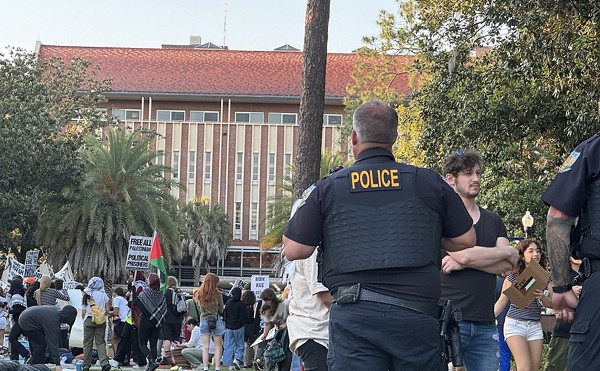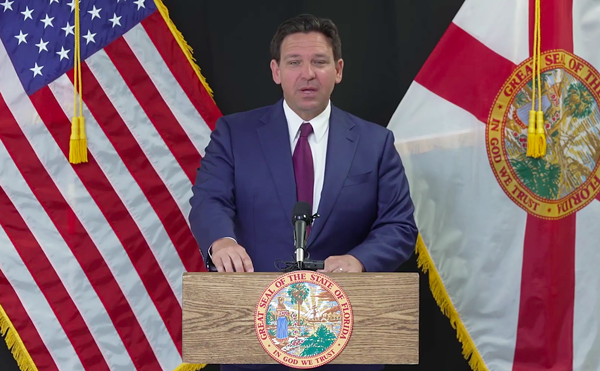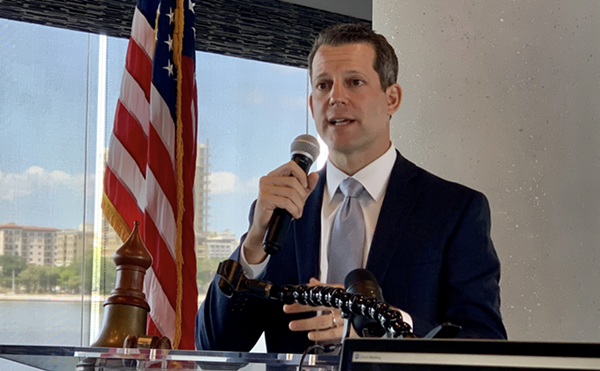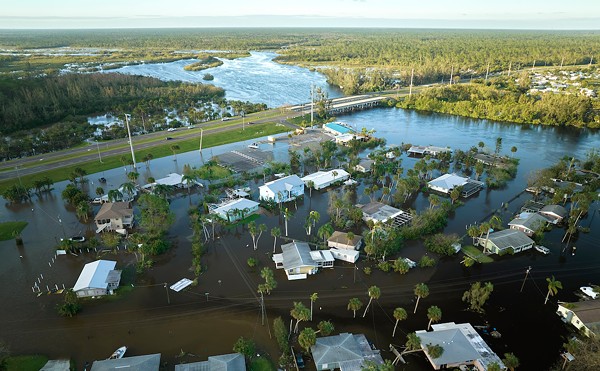Top GOP state legislators were working till nearly midnight (which for them is like 4 a.m.) finalizing a state budget proposal in the most stereotype-reinforcing manner possible: in a back-room deal, with no media, with plenty of attention to monied interests.
But at least they got it done, which is why they were in Tallahassee in June to begin with. The budget now still needs to pass in the State House and Senate, then it needs the signature of Governor Rick Scott, who could certainly wield his veto pen on some of the projects he deems unnecessary.
It's unclear exactly how much the budget will add up to, but those who negotiated it estimate it will amount to somewhere between $76 and $80 million billion*, reports the News Service of Florida, also noting the budget contains $301 million added in at the last minute for various projects. (Oh, by the way, they also passed a $400 million state tax cut package that randomly eliminated the state sales tax on gun club memberships.)
"This has been one of the most remarkable sessions for open, transparent debate and fervent positions on both sides, respecting each other, respecting their positions and yet having that debate," said House Appropriations Chair Richard Corcoran (R-Land O' Lakes), according to NSF. "This is the way government should work."
Senate Appropriations Chairman Tom Lee (R-Brandon) said the additional $301 million wasn't as last-minute as it seems.
"You're just now seeing it, but this has been the product of multiple days of discussions, multiple weeks, two sessions, and the fact that you're just now seeing it doesn't mean there hasn't been a real inclusive process that we followed to get to this place," he said.
Senate Minority Leader Arthenia Joyner (D-Tampa) called B.S., saying that only a privileged few were really able to keep up with the process.
"Just the mechanics of trying to keep up with what comes in front of you is difficult for people who have some knowledge about the process and, God forbid, people who don't have any knowledge about it, then they're lost," she told reporters.
Among projects that will get funding, assuming the budget passes unscathed (kind of a big assumption), are dollars to fund construction of a USF medical school in downtown Tampa (Vinikville, if you will) as well as a business school at USF's St. Pete campus.
There was plenty of what Tampa Bay Times reporter Steve Bousquet considered pork as well, including "a $1 million handout to the beef and beef products industry," an expansion of a sports training complex in Bradenton that went from $50,000 to $2 million over two days and, randomly, $100,000 for a rodeo arena enhancement in Davie (among many others).
They also added $19.5 million to the budget of Enterprise Florida, the agency that seeks to attract businesses to the state, which was a sore spot earlier on in the special session, which started June 1. Bousquet surmises that money was tacked on as a means of appeasing Gov. Scott, who can axe pretty much whichever project he chooses.
Meanwhile, environmentalists are poised to sue over lawmakers' proposed use of $700 million in funds voters expressly asked that the state set aside to buy and protect sensitive environmental lands. Voters approved Amendment 1 overwhelmingly — 75 percent of them voted for it.
But now, as you'd probably guess, there's a bit of a discrepancy between what environmentalists want and what lawmakers are proposing.
While Amendment 1 backers thought $300 million in environmental land buys was a reasonable number, lawmakers have signed of on using just $7.4 million to that end. They want to spend about half the Amendment 1 money on environmental protection measures funded elsewhere in the budget.
Among the most egregious F-yous to the spirit of the law and the sensibilities of those who voted for it is a $13.65 million giveaway to ag giant Alico for a practice called "water farming," which, as the Times put it, "pays private farmers to hold back water from Lake Okeechobee in an effort to filter pollutants before they reach the Everglades basin." This, despite the fact that buying state land for that use is much more efficient — but not for the lawmakers who, according to the Times, benefited substantially from Alico's PAC donations.
*Thanks to the reader who caught our typo.
















